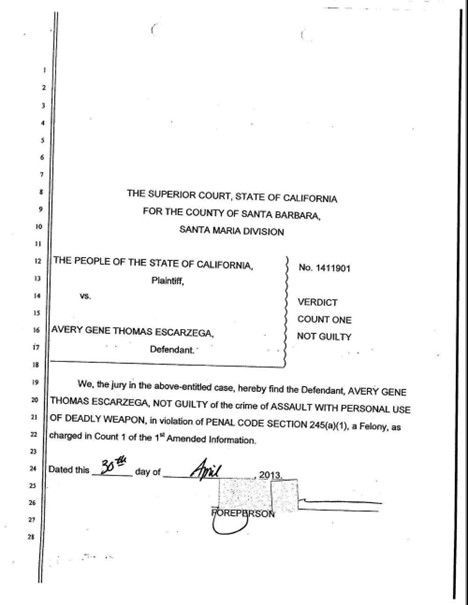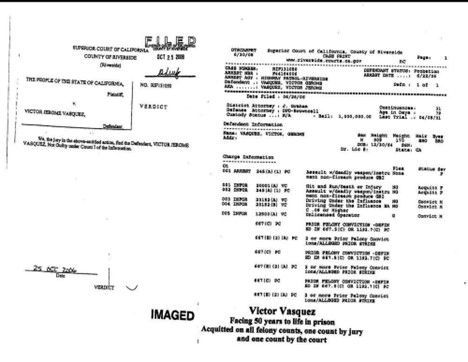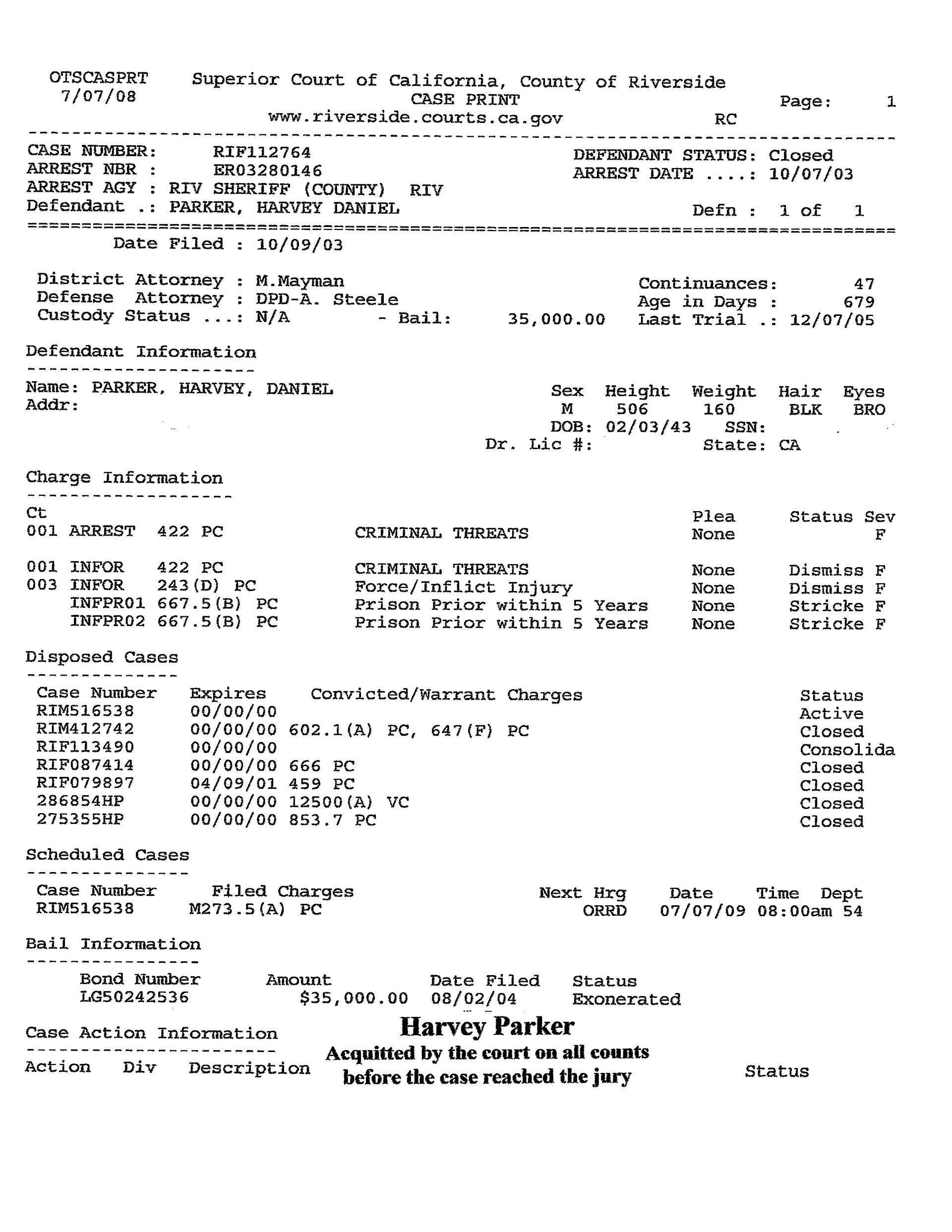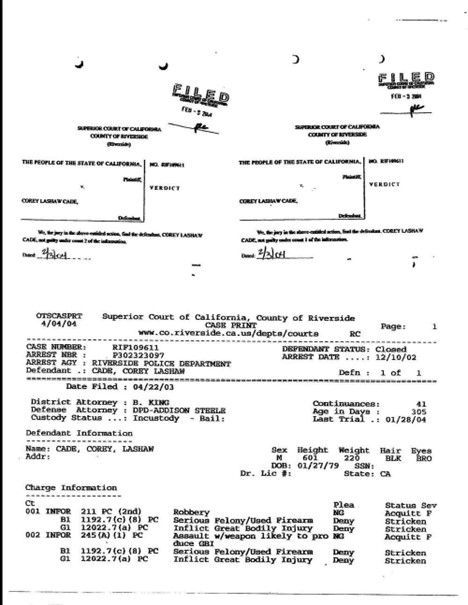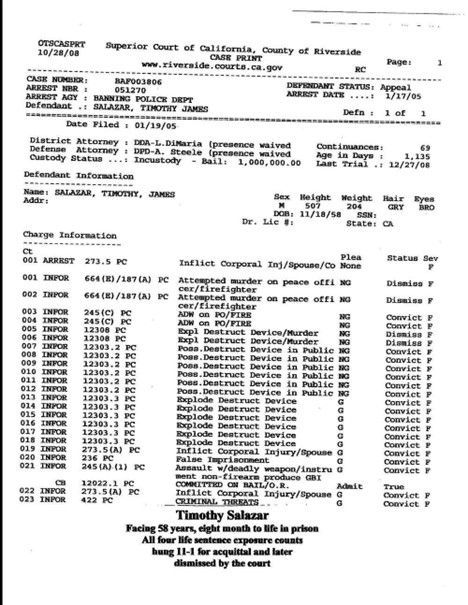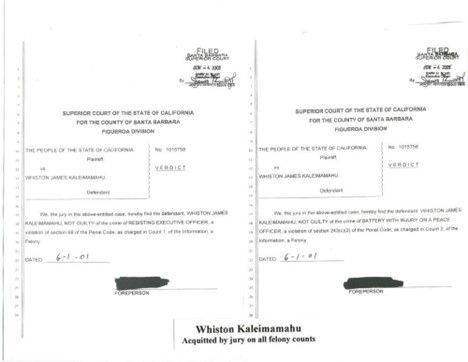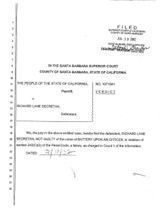Assault, battery or assault on a police officer cases
How the Steele Law Firm can help you if you are charged with assault, battery or assault on a Police Officer:
If a person is arrested for an assault the charge can be anything from a very minor misdemeanor (Penal Code § 240) to a violent strike felony with great bodily injury (Penal Code § 245(a)(1) with § 12022.7(a)) where the district attorney is seeking a prison sentence. A battery charge (Penal Code § 242) is a misdemeanor, but can still have damaging collateral consequences, such as loss of gun rights.
The first consideration in these cases is to determine the client's goals. Is it seek a dismissal of the case because the client is innocent, or is it to negotiate a reasonable outcome either because the client has some culpability or does not want to suffer the risks that come with fighting a case all the way to a jury trial.
If the goal is to negotiate a reasonable outcome, the Steele Law Firm is experienced in getting good outcomes. Criminal cases settle for positive outcomes when the attorney is known for fighting cases. If the district attorney knows that the attorney means it when he says that if the case cannot be settled for a reasonable outcome that there will be a jury trial, that's what leads to successful negotiations.
If the goal is to fight all the way you need the Steele Law Firm on your side. Addison is an extremely experienced trial lawyer. He has fought assault cases and battery cases and has won. He knows how to win these cases.
All the clients in the below examples gave permission to use their names and accounts of what happened to them and how they prevailed. All of the examples below are from public jury trials, so permission is not even required. These clients want the world to know about the successful outcomes of their cases. However, in order to be extra cautious only first names, last initials and case numbers are used.
Addison's trial successes include:
Two assault trials where the client was acquitted of all felony charges
(Victor V., RIF131050, a 50 years to life in prison sentence exposure case, an allegation of assault with a car, with an acquittal of all felony charges and only convicted of an unrelated DUI, and Avery E., 1411901, who was acquitted of all felony charges, which were three counts of assault, and only convicted of a misdemeanor lesser offense of simple assault, Penal Code § 240.
Twenty-one assault acquittals (Penal Code §§ 245(a)(1), 243(d), 245(a)(4) or 240)
(Victor V., RIF131050, Avery E., 1411901, three counts and the great bodily injury allegations were not reached because of the acquittals as well as acquittals on two counts of misdemeanor assault lesser included offenses, Corey C., RIF109611, the great bodily injury allegation was not reached because of the acquittal, Harvey P., RIF112764, acquitted of all charges by a granted Penal Code § 1118.1 motion during trial, Eugene F., RIF135704, and Robert M., RIF135704, the great bodily injury and gang allegations were not reached because of the acquittal, Ronnell B., RIF113393, acquitted of a misdemeanor assault lesser included offense, Antonin I., 1461668, acquitted of five counts of misdemeanor assault lesser included offenses, Mariano L., 1501535, acquitted of two counts of misdemeanor assault lesser included offenses, Ronald L., 17CR01821, acquitted of a misdemeanor assault lesser included offense, and Gabriel V., 18CR03764, acquitted of a misdemeanor assault lesser included offense).
Eleven battery (Penal Code § 242) acquittals, two hung jury battery counts and one battery count dismissed during trial.
(Antonin I., 1461668, five acquitted counts of battery lesser included offenses, Mariano L., two acquitted counts of battery lesser included offenses, Dennis C., RIF126995, acquitted of a battery lesser included offense, Ronald L., 17CR01821, acquitted of a battery lesser included offense, Gabriel V., 18CR03764, acquitted of a battery lesser included offense, Truman G., 1463524, hung jury on a battery count that was later dismissed, Jorge D.C., 1411049, hung jury on a battery count that was later dismissed, and Rachel W., 19CR00491, a battery count that was dismissed during trial.)
Assault or battery cases can be difficult to defend because they are often a contest between what the complaining witness (the alleged victim) says happened and what, in fact, happened. Assault on a police officer cases can also be difficult because jurors tend to defer to police officers. If there's an allegation that a weapon was used or great bodily injury, a conviction is a strike. If you need to hire a lawyer for an assault case, you need a lawyer who has experience with assault trials and who has won assault trials that have gone before a jury.
The only thing that matters for a successful negotiation and positive outcome is having a lawyer that the district attorney knows will go to trial and has had success at trial. Addison has 20 acquitted assault counts and 11 acquitted battery counts, and has done 24 jury trials with assault or battery charges. Because the district attorney decides which cases go to trial, and most of the time, only cases with strong prosecution evidence go to trial, a defense attorney expects to win maybe one in ten trials. Addison's record of successful outcomes in 16 of 25 jury trials far surpasses that.
The best outcomes are when a negotiated settlement can be reached that is beneficial to the client. These are a couple of examples of positive outcomes followed by Addison's assault or battery jury trial successes:
Omar S.R., 23CR09003
Charges: Assault with serious bodily injury (Penal Code § 243(d)), assault by means or force likely to produce great bodily injury (Penal Code § 245(a)(4)) with an allegation of great bodily injury (12022.7(a)), and criminal threats (422).
Exposure: Eight years eight months in prison and convictions for two violent strikes and one serious strike.
Outcome: Resolved the case for a non-strike assault and credit for time served so Omar could go home.
Omar and two co-defendants were accused of attacking another inmate in the jail. Omar was already on felony probation so the district attorney wanted to send him to prison. Once it was clear that the case was going to go to trial and that Addison was not going to allow Omar to get a prison sentence or convictions for strikes without a fight, Addison was then able to settle the case for a non-strike assault and credit for time served so Omar could go home. His two co-defendants were not able to resolve their cases.
This is Omar and Addison outside of the jail after Omar was released.
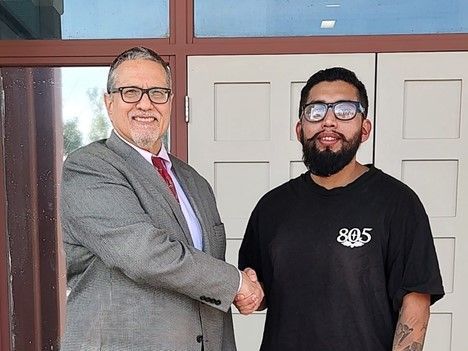
Rachel H.,
Rachel was accused of a battery against a person that had horned his way into moving into her apartment under the guise of being a caretaker because Rachel is blind. Rachel eventually grew tired of him mooching off her and told him that he had to leave. On his way out the door he pushed Rachel to the ground and left her behind on the ground. The police were called by a concerned neighbor. The perpetrator then told the police that Rachel had pushed him. The case went to the district attorney to decide whether or not to file a battery charge. Addison advocated for Rachel with the district attorney that was going to make the decision the charging decision. After Addison’s advocacy the district attorney decided to reject the case. No charges were filed.
This is Rachel and Addison
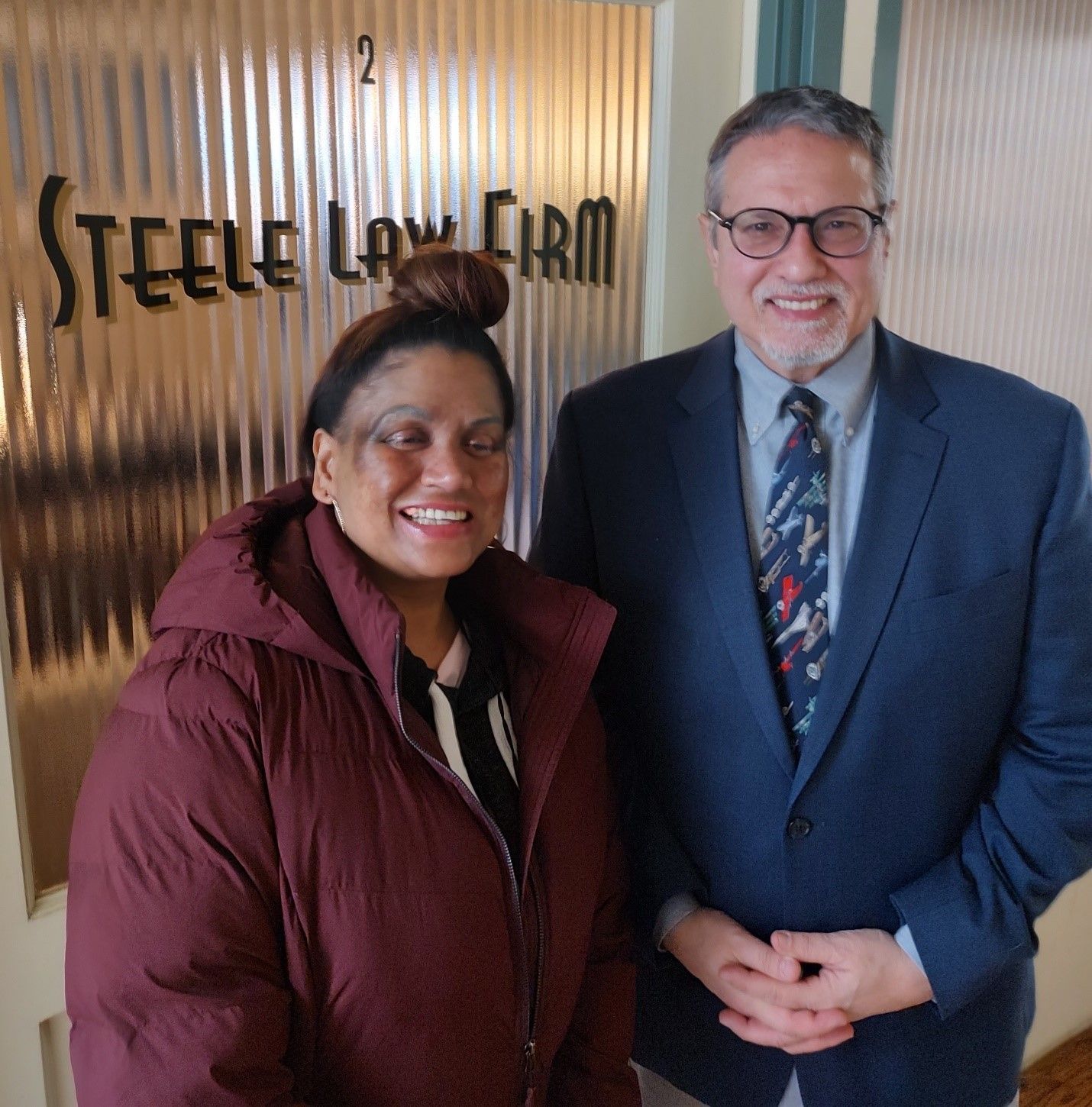
Avery E., 1411901
- Charges: Assault with a knife (Penal Code § 245(a)(1) with an allegation of great bodily injury (Penal Code § 12022.7(a)), assault by means or force likely to produce great bodily injury (Penal Code § 245(a)(4)), a separate assault by means or force likely to produce great bodily injury (Penal Code § 245(a)(4)).
- Exposure: Avery was facing 17 years eight months in prison, but was as facing being convicted of three violent strike offenses.
- Outcome: Despite Avery's father's testimony that Avery had stabbed him in the back and a correctional officer's testimony that she saw Avery assaulting another inmate in the jail, the jury acquitted Avery of all felony charges. He was only convicted of a misdemeanor lesser offense of simple battery. He was sentenced to credit for time served and released.
This is the Verdict Form from the lead charge in Avery case, he was acquitted of all felonies in the case.
Victor V., RIF131050
- Charges: Assault with a car (Penal Code § 245(a)(1), hit and run (Vehicle Code § 20001(a)) and a later driving under the influence (Vehicle Code §§ 23152(a)&(b)) with two prior strikes alleged making it a life in prison exposure case.
- Exposure: Victor was facing fifty years to life in prison.
- Outcome: Despite Victor's girlfriend's testimony that Victor had tried to run her over with his pickup truck, the jury acquitted Victor of all charges except a conceded unrelated driving under the influence charge. Victor was given credit for time served for the DUI and released from jail. He now runs his own lawn care business.
The Verdict Form and Minute Order where Victor was saved from a life in prison sentence.
Harvey P., RIF112764
Charges: Criminal threats (Penal Code § 422) and assault with serious bodily injury (Penal Code § 243(d)).
Exposure: Harvey was facing four years eight months in prison, and a conviction for a violent strike as well as a serious strike
Outcome: All charges were acquittals after a granted Penal Code § 1118.1 motions during trial, Harvey was released from jail and went home.
Corey C., RIF109611
- Charges: Robbery (Penal Code § 211) and assault (Penal Code § 245(a)(1)), both with great bodily injury alleged (Penal Code § 12022.7(a)) and a separate unrelated robbery (Penal Code § 211).
- Exposure: Corey was facing thirteen years eight months in prison, as well as conviction for three strike counts.
- Outcome: Despite Addison filing a motion to sever the two unrelated robbery charges, the two were tried at the same time. Corey was acquitted of all charges and lesser included offenses for the more serious of the two allegations, which were assault with great bodily injury alleged and robbery. Because of the not guilty verdicts, the great bodily injury allegations were not reached and made moot. He was convicted of the less serious allegation and sentenced to the low term of two years in prison.
This is Corey's Minute Order and verdict forms
Robert M., RIF135704
- Charges: Murder (Penal Code § 187(a)) with a special circumstance of gang murder (Penal Code § 190.2(a)(22)) with personal use of a weapon (a knife) (Penal Code § 12022(b)(1)), assault with a knife (Penal Code § 245(a)(1)) and gang crime (Penal Code § 186.22(a)).
- Exposure: Robert was facing life in prison without the possibility of parole (LWOPP).
- Outcome: Robert was acquitted of first degree murder, that meant that he could not subjected to the special circumstance and could not get LWOPP. The jury hung on second-degree murder and hung on the gang crime allegation ten to two in favor of acquittal. He was acquitted by the court of the assault charge in the middle of the trial. A different attorney did his second trial and he was convicted of second-degree murder and gang crime.
This was a challenging murder trial because the incident was a fight in a crowded upscale sushi restaurant. The evidence that was presented by Addison was that another person was the stabber and that stabbing was in self-defense. The allegation was that Robert did the stabbing with a broken beer bottle, but that improvised weapon was not among the debris in the restaurant. After 43 court days in trial, the jury acquitted Robert of first degree murder. That meant that the gang special circumstance could not be reached, which meant that Robert could not get an LWOPP sentence. The jury hung on second degree murder. He was also acquitted of assault with a knife, which meant that the great bodily injury enhancement and the gang enhancement would not be reached on that count. After the trial Addison was transferred to a unit in the public defenders office that exclusively worked on capital murder cases, so his case was reassigned to another lawyer in the office. Robert's family didn't have confidence in that lawyer and hired an attorney to do the retrial. That trial lasted two weeks and Robert was convicted of all the remaining charges.
Below is an exhibit that Addison used in his closing argument to emphasize that there was no broken bottle that could have been used as the murder weapon
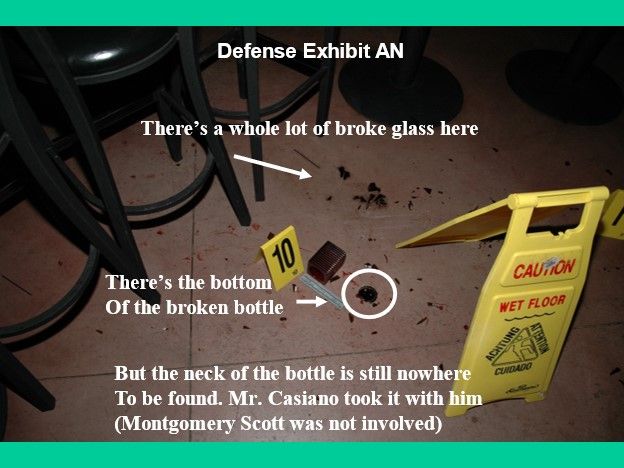
Eugene F., RIF134818
- Charges: Torture (Penal Code § 206), robbery (Penal Code § 211), residential burglary (Penal Code § 459), auto theft (Vehicle Code § 10851), assault (Penal Code § 245(a)(1)), kidnapping (Penal Code § 207) and false imprisonment (Penal Code § 237(a)).
- Exposure: Eugene was facing twenty-six years, eight months to life in prison.
- Outcome: Eugene was acquitted of the assault charge, the kidnapping charge and the lesser included offense. He was convicted of the rest of the charges. He was sentenced to ten years to life. He has been paroled and is home now.
Questions you should ask an attorney that you are considering hiring for an assault case:
- Have you done an assault trial before?
- This question is important because an assault trial typically involves the testimony of the complaining witness (alleged victim) against what really happened. It requires an experienced attorney that is skilled in questioning a complaining witness.
- Addison has done 25 assault or battery trials.
- What were the results of your assault trials?
- This question is important because in an assault trial there are so many ways to fight hard and win. If an attorney has won several assault trials, that attorney has the experience and skills to handle the level of complexity involved in an assault trial.
- Addison has had successful outcomes in assault counts in 16 of the 25 assault or battery trials he's done. He has 30 acquitted counts in these cases, as well two hung jury counts and a count dismissed during trial. If you find another attorney that has done the number of assault or battery trials that he has done and has had more successful outcomes than he has had, hire that person. If you want the best possible chance of not going to prison and potentially going home, you should contact Addison.
- Do you train others lawyers in your techniques for winning assault trials?
- This question is important because typically only the leading lawyers in a field are invited to conduct trainings of other lawyers.
- Addison was a speaker at the California Public Defenders Association (CPDA) homicide defense training in 2011 to train on my winning trials by humanizing the client method. He has also given that same training at the Riverside County Public Defenders Office, the Riverside County Barristers, the Santa Clara County Public Defenders Office, Santa Barbara County Public Defenders Office and the San Francisco County Public Defenders Office. He was a speaker at the CPDA homicide defense training in 2012 to train on utilizing a neuropsychologist in a homicide case. All these skills and techniques that I teach are easily utilized in assault trials.
- How long were the assault trials you've done and how many days of defense did you present?
- These questions are important because although some cases just call for a short trial, a short trial can also mean that the prosecution was not sufficiently challenged or that no defense was presented. An assault trial that lasts five or ten court days is reason for concern because it's an indicator that the prosecution is not being thoroughly challenged and a complete defense is not being presented.
- Addison has spent 314 court days in assault trials. He has a success rate in assault trials that is really unparalleled.
Assault or Battery Against a Police Officer
Addison Steele has:
One jury trial that was an alleged attempted murder of police officers with bombs. The trial resulted in a hung jury, 11-1 in favor of acquittal, the judge then dismissed all the life sentence exposure counts by a granted Marin County Motion. (Timothy S., BAF003806)
Five jury trials with acquittals for charges of assault on a police officer or battery on a police officer
(Penal Code §§ 243(c)(2) or 243(b))
(Whiston K., 1015758, acquitted of felony assault and felony resisting arrest, Richard S., 1071841, acquitted of felony assault on a police officer and felony resisting arrest was reduced to a misdemeanor by the judge before sentencing, Derek H., 1073166, acquitted of battery on a police officer and felony resisting arrest was reduced to a misdemeanor by the judge before sentencing, David D., RIF115383, acquitted of two counts of battery on a police officer by a granted Penal Code § 1118.1 motion during trial, and Adrian J., RIF115383, acquitted of felony resisting arrest and battery on a police officer).
Assault or battery cases on a police officer can be difficult to defend because a lot of jurors have a predisposition to favor the police. Another problem is that a lot of defense attorneys are afraid to aggressively attack the police for fear of alienating jurors. Addison has approached these cases with the mentality that the jurors expect him to do his job, and his job is to vigorously defend his client, even if it hurts an officer's feelings. One of his proudest moments was when he was a young attorney doing one of these trials, and the officer testified that a scratch (it really was a scratch, like a person gets when playing with a kitten) was an injury. His question for the officer on cross-examination was, "Would you categorize that 'injury' as more of a 'boo boo' or an 'owey.'" The jury laughed, and the district attorney's objection was sustained, but at that moment, he threw out the "jurors don't like it if you're tough on the officer on the witness stand" mentality, not that he ever had that mentality.
The reality in almost all assault or battery against officer cases, especially the felony Penal Code § 243(c) cases, is that the officers beat someone up, and now the district attorney is charging that person with assault on a police officer in order to cover for the police. If you need to hire a lawyer for an assault or battery against a police officer case, you need a lawyer who has experience with assault and battery against a police officer trials, and who has won assault and battery against a police officer trials that have gone before a jury. Addison has not only done many assault and/or battery against police officer trials, but he has had successful outcomes in them. He has done eight assault or battery on a police officer trials and won six of them, county the attempted murder of cops with bombs and attempted murder with bombs case where he beat all of those charges and only lost the assault on officers charges as a win. Because the district attorney decides which cases go to trial, and most of the time, only cases with strong prosecution evidence go to trial, a defense attorney expects to win maybe one in ten trials. Addison's record of six out of eight trial wins in assault or battery against police officer trials far surpasses one out of ten.
Addison's assault and battery against a police officer trial successes include:
Timothy S., BAF003806
- Charges: Double attempted murder of police officers (Penal Code § 664(e)/187(a)) with bombs, double assault on a police office (Penal Code § 245(c)), double exploding bombs with the intent to kill (Penal Code § 12308), six counts of possession of bombs (Penal Code § 12303.2) and six counts of threatening with bombs (Penal Code § 12303.3).
- Exposure: Tim was facing fifty-eight years, eight months to life in prison.
- Outcome: The double attempted murder of police officers was hung eleven to one in favor of acquittal, exploding bombs with the intent to kill hung eleven to one in favor of acquittal, threatening with bombs hung seven to five in favor of acquittal, he was convicted of double assault of police officers and the conceded possession of bombs charges. The judge granted my motion to dismiss the all the charges that had hung eleven to one in favor of acquittal, the ruling on that motion saved Tim from life in prison. He later pled guilty to the charges that hung seven to five in favor of acquittal in exchange for an agreement that he would only be sentenced to concurrent time with whatever sentence he got for the convicted charges. He was sentenced to twelve years, eight months in prison.
The Minute Order where Tim was saved from a life in prison sentence.
Whiston K., 1015758
- Charges: Resisting arrest with force (Penal Code § 69) and assault on a police officer (Penal Code § 243(c)(2).
- Exposure: Whiston was facing three years, eight months in prison.
- Outcome: Whiston was acquitted of all felony charges and was sentenced to misdemeanor probation without any actual jail time. He came to the rescue of his fellow college football player when the police in Isla Vista were arresting his friend. The police then beat up Whiston. A bystander videotaped the beating. The bystander testified that he filmed it because he felt, "It was like Rodney King." The police threatened the bystander with arrest for filming the beating and confiscated his video camera. An uninvolved UCSB student that witnessed the incident testified that she couldn't be sure which police beating it was until she saw the videotape of the incident because she had seen so many police beatings in Isla Vista. None of that evidence stopped the district attorney who fought the whole way in order to try to protect the police. Whiston was playing football at the community college level; if he had been convicted of a felony, it would have severely impacted his prospects of getting a football scholarship to a four-year university. He went on to play at South Dakota State. He is now working as a teacher in Hawaii.
The verdict forms where the jury acquitted Whiston of all felony charges.
Adreian J., RIF115383
- Charges: Possession of crack cocaine for sales (Health and Safety Code § 11351.5), transportation of rock cocaine (Health and Safety Code § 11352(a)), possession of a weapon (a billy club) (Penal Code § 12020(a)(1), resisting arrest with force (Penal Code § 69), battery on a police officer (Penal Code § 243(b)) and destroying evidence (Penal Code § 135), special allegations of two prison term priors (Penal Code § 667.5(b) and two dope sales priors (Health and Safety Code § 11370.2(a)).
- Exposure: Adreian was facing fourteen years, four months in prison.
- Outcome: Adreian was acquitted of possession for sales, he was convicted of the conceded lesser included offense of simple possession for personal use, convicted of transportation of crack cocaine, he was acquitted of possession of a billy club, he was acquitted of resisting arrest with force, acquitted of battery on a police officer, and only convicted of the misdemeanor lesser included offense of resisting arrest and misdemeanor destroying evidence. He was sentenced to prison and has paroled and is home now.
Derek H., 1073166
- Charges: Resisting arrest with force (Penal Code § 69), trespassing (Penal Code § 602.1(a)), and battery on a police officer (Penal Code § 243(b)).
- Exposure: Derek was facing three years in prison.
- Outcome: Derek was acquitted of battery on a police officer. He was convicted of trespassing, and he was convicted of resisting arrest with force, but the judge reduced the conviction to a misdemeanor after trial, he was sentenced to misdemeanor probation and could not be sent to prison even if he violated his probation because he was only convicted of misdemeanors.
Richard S., 1071841
- Charges: Assault on a police officer (Penal Code § 243(c)(2)), resisting arrest (Penal Code § 69), domestic violence (Penal Code § 273.5(a) and failure to appear in court (Penal Code § 1320.5).
- Exposure: Richard was facing five years, four months in prison.
- Outcome: Despite his girlfriend testifying that Richard had hit her, a highway patrolman testifying that Richard had hit him, and testimony that court records showed that he had not appeared in court, Richard was found not guilty of assault on a police officer and all the lesser included offenses with that charge, not guilty of domestic violence and the lesser included offense, and not guilty of failure to appear in court. He was found guilty of resisting arrest, but the judge immediately reduced that charge to a misdemeanor. The incident was a result of a Highway Patrol stop on the Highway 101. An inexperienced Highway Patrol officer started the encounter by pulling out his gun and pointing it Richard and his child that was next to him in a car seat. When the other more experienced Highway Patrol officer was asked on the witness stand why he didn't pull and point his gun, he answered with two words, "More experienced." Richard was sentenced to misdemeanor probation and could not be sent to prison even if he violated his probation because he was only convicted of a misdemeanor.
This is the Verdict Form where Richard was found NOT GUILTY of assault on a police officer.
David D., RIF115383
- Charges: Two counts of assault on a police officer (Penal Code § 243(b)), resisting arrest (Penal Code § 148(a)(1)), domestic violence (Penal Code § 273.5(a)) and vandalism (Penal Code § 594(b)(1)).
- Exposure: David was facing six years in prison.
- Outcome:
David was acquitted of both counts of assault on a police officer by the judge by a granted Penal Code and § 1118.1 motion during trial and acquitted of the lesser included offenses by the jury. He was found not guilty of domestic violence by the jury, the lesser included offense was hung ten to two in favor of acquittal and later dismissed by the judge. David was convicted of vandalism and resisting arrest and sentenced to probation.
Questions you should ask an attorney that you are considering hiring for an assault and/or battery on a police officer case:
- Have you done an assault and/or battery on a police officer trial before?
- This question is important because an assault or battery against a police officer trial typically involves the testimony of the complaining cop witness (alleged cop victim) against what really happened. It requires an experienced attorney that is skilled in questioning a cop complaining witness.
- Addison has done seven assault or battery against a police officer trials, and he won six (and in reality won all seven because the one loss was also a victory against attempted murder of cops with bombs).
- What were the results of your resisting arrest trials?
- This question is important because in an assault or battery against a police officer trial there are so many ways to fight hard and win and the attorney has to be willing to stand up and fight, even if it's against a cop witness. If an attorney has won several assault or battery against a police officer trials, that attorney has the experience and skills to handle the level of complexity involved in an assault or battery against a police officer trial.
- Addison has won six of the eight assault or battery against a police officer trials he's done, counting the attempted murder of cops with bombs case where the client won all life sentence exposure charges and only lost the assault on officers charges as a win. He has 11 acquitted counts in these types of cases. If you find another attorney that has done the number of assault or battery against police officers trials that he has done and has had more successful outcomes than he has had, hire that person. If you want the best possible chance of winning your case, you should contact Addison.
- Do you train other lawyers in your techniques for winning assault or battery against a police officer trials?
- This question is important because, typically, only the leading lawyers in a field are invited to conduct training of other lawyers.
- Addison was a speaker at the California Public Defenders Association (CPDA) homicide defense training in 2011 to train on my winning trials by humanizing the client method. He has also given that same training at the Riverside County Public Defenders Office, the Riverside County Barristers, the Santa Clara County Public Defenders Office and the San Francisco County Public Defenders Office. I was a speaker at the CPDA homicide defense training in 2012 to train on utilizing a neuropsychologist in a homicide case. All these skills and techniques that I teach are easily utilized in assault or battery against a police officer trials.
- How long were the assault or battery against a police officer trials you've done and how many days of defense did you present?
- These questions are important because although some cases just call for a short trial, a short trial can also mean that the prosecution was not sufficiently challenged or that no defense was presented. An assault or battery against a police officer trial that lasts five or so court days is reason for concern because it's an indicator that the prosecution is not being thoroughly challenged and a complete defense is not being presented.
- Addison has spent 81 court days in assault or battery against a police officer trials. He has a success rate in resisting arrest trials that is really unparalleled.
CONTACT INFORMATION
Phone: (805) 995-9368
Email: addison@steelelawfirmsb.com
Address: 1226 1/2 State St., Suite 2, Santa Barbara, CA 93101

